NestJs 使用 RabbitMQ
既然是使用 RabbitMQ 那先不管其他的 把 RabbitMQ 装上再说
RabbitMQ 安装
这里直接找他们官网就行
https://www.rabbitmq.com/download.html
这里我们选择使用 docker 安装 快捷方便
这里直接参考:
https://juejin.cn/post/7198430801850105916
我们要站在巨人的肩膀上,快速学习,具体命令
RabbitMQ docker方式安装
# 下载最新的代码 management 的镜像
docker pull rabbitmq:management
# 创建数据卷
docker volume create rabbitmq-home
# 启动容器
docker run -id --name=rabbitmq -v rabbitmq-home:/var/lib/rabbitmq -p 15672:15672 -p 5672:5672 -e RABBITMQ_DEFAULT_USER=admin -e RABBITMQ_DEFAULT_PASS=admin rabbitmq:management
这里除了挂载数据卷之外,还暴露了两个端口,以及设定了两个环境变量:
15672端口:RabbitMQ的管理页面端口5672端口:RabbitMQ的消息接收端口RABBITMQ_DEFAULT_USER环境变量:指定RabbitMQ的用户名,这里我指定为admin,大家部署时替换成自己定义的RABBITMQ_DEFAULT_PASS环境变量:指定RabbitMQ的密码,这里我指定为admin,大家部署时替换成自己定义的
这样容器就部署完成了!在浏览器访问你的服务器地址:15672即可访问到RabbitMQ的管理界面,用户名和密码即为刚刚指定的环境变量的配置值。
这里没有指定
LANG=C.UTF-8,是因为RabbitMQ容器默认就是这个语言环境,无需我们再设定。
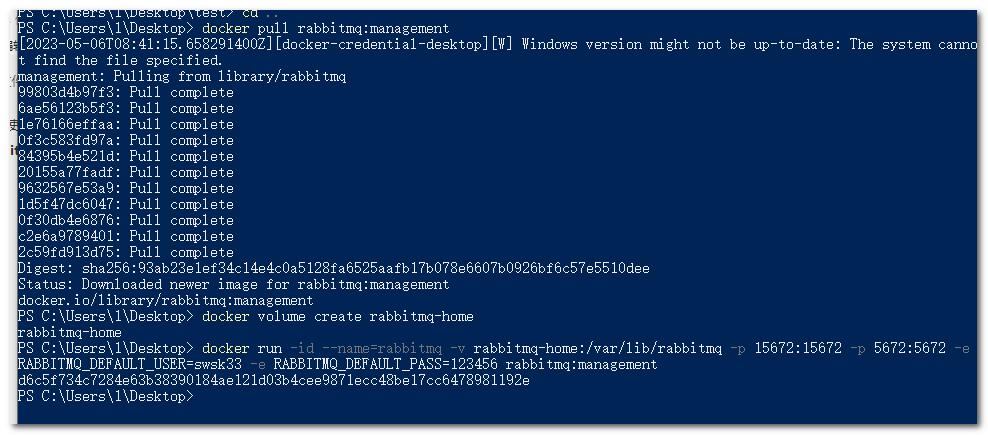
访问管理页面
http://localhost:15672/
用户名:admin
密码:admin
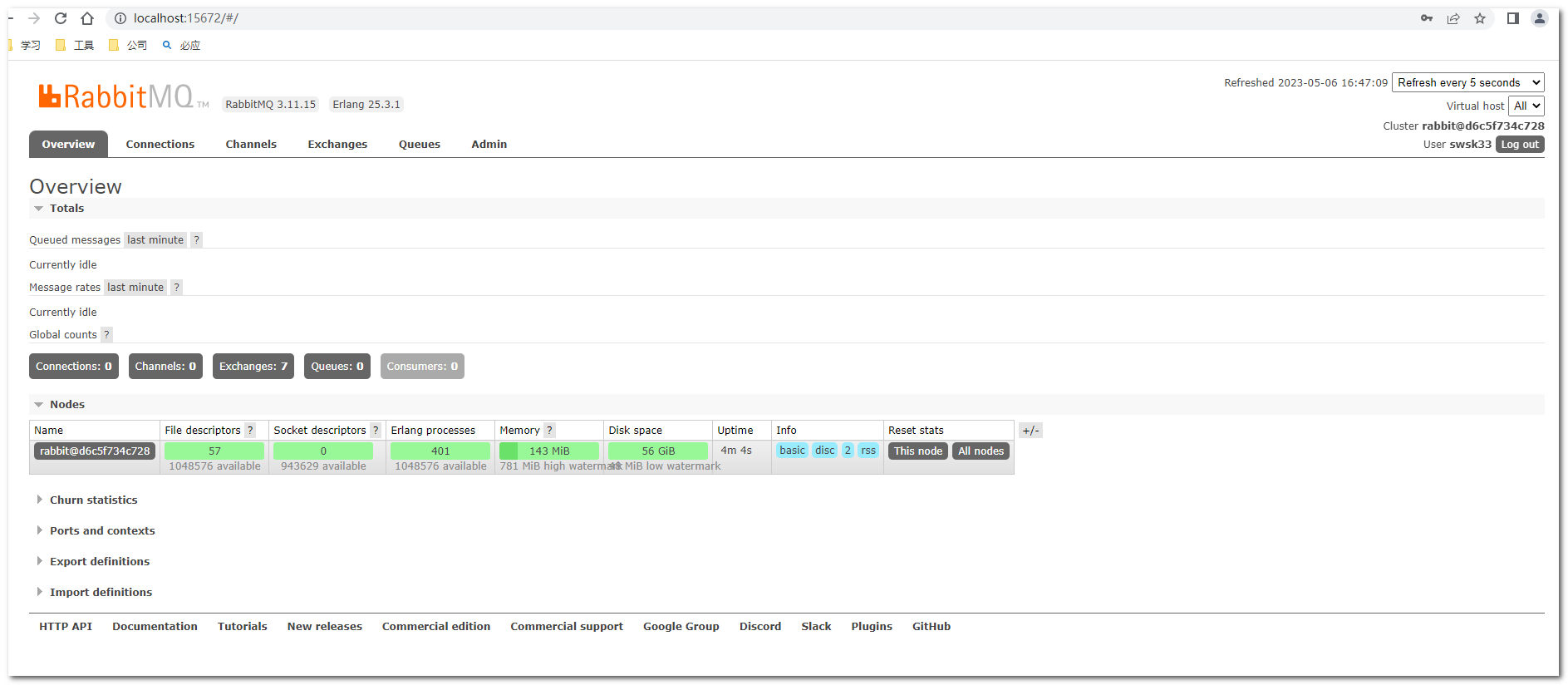
可以看到已经进去了
前置知识
RabbitMQ的exchange、bindingkey、routingkey的关系
https://zhuanlan.zhihu.com/p/37198933 原文
https://www.cnblogs.com/makalochen/p/17378002.html 转载
总之:
从 AMQP 协议可以看出,Queue、Exchange 和 Binding 构成了 AMQP 协议的核心
-
Producer:消息生产者,即投递消息的程序。
-
Broker:消息队列服务器实体。
-
- Exchange:消息交换机,它指定消息按什么规则,路由到哪个队列。
- Binding:绑定,它的作用就是把 Exchange 和 Queue 按照路由规则绑定起来。
- Queue:消息队列载体,每个消息都会被投入到一个或多个队列。
-
Consumer:消息消费者,即接受消息的程序。
Binding 表示 Exchange 与 Queue 之间的关系,
我们也可以简单的认为队列对该交换机上的消息感兴趣,
绑定可以附带一个额外的参数 RoutingKey。
Exchange 就是根据这个 RoutingKey 和当前 Exchange 所有绑定的 Binding 做匹配,
如果满足匹配,就往 Exchange 所绑定的 Queue 发送消息,
这样就解决了我们向 RabbitMQ 发送一次消息,可以分发到不同的 Queue。
RoutingKey 的意义依赖于交换机的类型。
amqb api 文档
https://amqp-node.github.io/amqplib/channel_api.html
只有看了官方文档才能更正确的使用
NesJs 使用 mq 文档
https://docs.nestjs.cn/9/microservices?id=rabbitmq
日志依赖
https://www.npmjs.com/package/winston
https://github.com/winstonjs/winston
https://github.com/gremo/nest-winston
https://docs.nestjs.cn/9/techniques?id=日志
https://juejin.cn/post/7187910528918880311
npm install --save nest-winston winston winston-daily-rotate-file
NestJs 中使用
安装依赖包
npm i --save amqplib amqp-connection-manager @nestjs/microservices
上面三个包基础包,这里还有方便的包
https://github.com/golevelup/nestjs/blob/master/packages/rabbitmq/README.md
所以完整的安装依赖应该为
npm i --save amqplib amqp-connection-manager @nestjs/microservices @golevelup/nestjs-rabbitmq
创建 发布消息模块
nest g mo mqPublist
nest g s mqPublist

这样使用cli 工具就自动给我们 将 service 和 module 关联起来了,并在 全局模块中注册了
连接RabbitMQ
在写其他代码之前我们首先要保证,连接正常
全局注册模块
首先保证我们的 MqPublistModule模块在全局注册
app.module.ts
import { MiddlewareConsumer, Module } from '@nestjs/common';
import { AppController } from './app.controller';
import { AppService } from './app.service';
import { CatsController } from './cats/cats.controller';
import { MakaloModule } from './makalo/makalo.module';
import { UploadModule } from './upload/upload.module';
import { UserModule } from './user/user.module';
import { Module1Module } from './module1/module1.module';
import { ConfigModule } from './config/config.module';
import { PModule } from './p/p.module';
import { MqPublistModule } from './mq-publist/mq-publist.module';
// 日志模块
import { WinstonModule } from 'nest-winston';
import * as winston from 'winston';
import 'winston-daily-rotate-file';
@Module({
imports: [MakaloModule, UploadModule, UserModule, Module1Module,
ConfigModule.forRoot({ path: '/makalo' }),
PModule,
MqPublistModule,
// 日志模块
WinstonModule.forRoot({
transports: [
new winston.transports.DailyRotateFile({
dirname: `logs`, // 日志保存的目录
filename: '%DATE%.log', // 日志名称,占位符 %DATE% 取值为 datePattern 值。
datePattern: 'YYYY-MM-DD', // 日志轮换的频率,此处表示每天。
zippedArchive: true, // 是否通过压缩的方式归档被轮换的日志文件。
maxSize: '20m', // 设置日志文件的最大大小,m 表示 mb 。
maxFiles: '14d', // 保留日志文件的最大天数,此处表示自动删除超过 14 天的日志文件。
// 记录时添加时间戳信息
format: winston.format.combine(
winston.format.timestamp({
format: 'YYYY-MM-DD HH:mm:ss',
}),
winston.format.json(),
),
}),
],
}),
],
controllers: [AppController, CatsController],
providers: [AppService],
})
export class AppModule { }
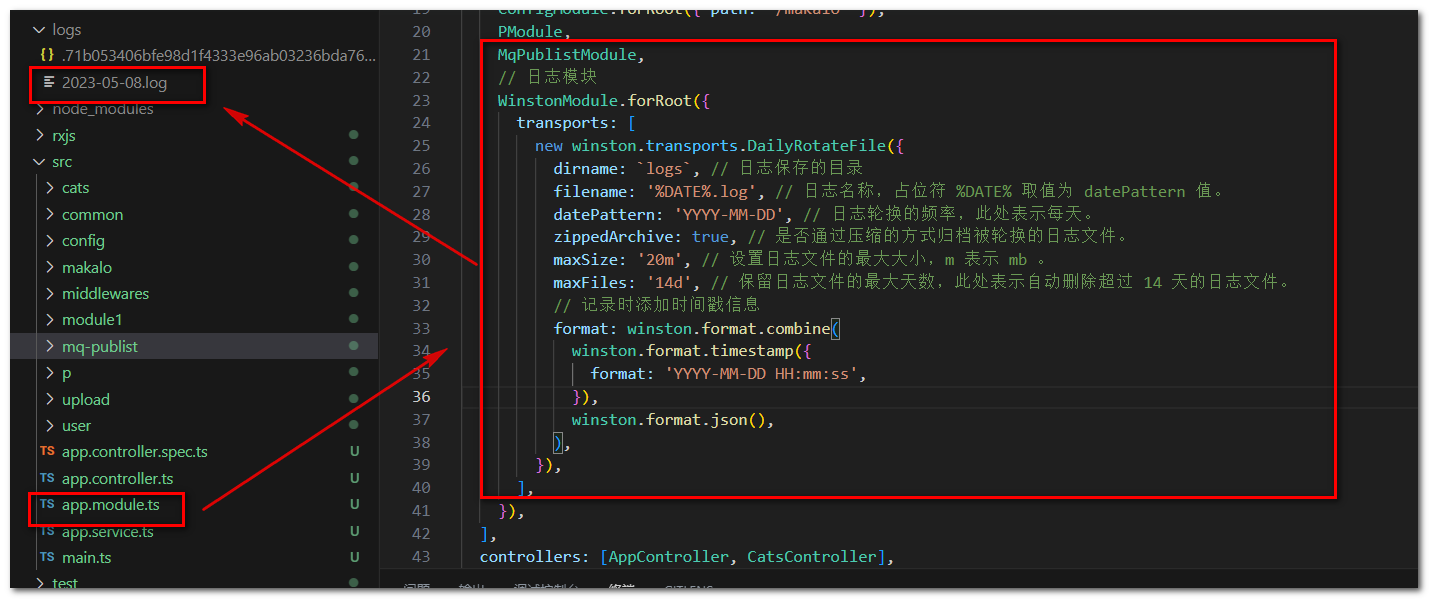
MqPublistModule 模块的RabbitMQ 配置
import { Module } from '@nestjs/common';
import { RabbitMQModule, MessageHandlerErrorBehavior } from '@golevelup/nestjs-rabbitmq';
import { MqPublistService } from './mq-publist.service';
@Module({
imports: [
RabbitMQModule.forRootAsync(RabbitMQModule, {
useFactory: () => {
return {
// 交换机配置
exchanges: [
{
// 交换机名称
name: `exchanges_test`,
/**
* 交换机类型
* direct: 直连交换机,根据消息的路由键(routing key)将消息发送到一个或多个绑定的队列。
fanout: 扇形交换机,将消息广播到所有绑定的队列,无需指定路由键。
topic: 主题交换机,根据消息的路由键模式匹配将消息发送到一个或多个绑定的队列。
headers: 头交换机,根据消息的头部信息将消息发送到一个或多个绑定的队列。
*/
type: 'direct',
// 其他选项
// 持久化(Durable): 指定交换机、队列或消息是否需要在服务器重启后保留
options: { durable: false },
},
],
// 连接的url
uri: 'amqp://admin:admin@localhost:5672',
/**
* 用于配置 RabbitMQ 连接的选项。它是一个对象,可以包含以下属性:
wait: 一个布尔值,表示是否等待连接成功后才开始启动应用程序。默认为 true。
rejectUnauthorized: 一个布尔值,表示是否拒绝不受信任的 SSL 证书。默认为 true。
timeout: 一个数字,表示连接超时时间(以毫秒为单位)。默认为 10000 毫秒。
heartbeatIntervalInSeconds: 一个数字,表示心跳间隔时间(以秒为单位)。默认为 60 秒。
channelMax: 一个数字,表示最大通道数。默认为 65535。
这些选项将影响 RabbitMQ 连接的行为和性能。您可以根据需要进行调整
*/
connectionInitOptions: { wait: false },
/**
* 用于启用直接回复模式。当设置为 true 时,
* 生产者将使用 replyTo 和 correlationId 字段指定的队列和标识符来接收响应,
* 而不是使用默认生成的匿名队列。这使得消费者可以将响应直接发送到请求者所在的队列,
* 从而避免了性能上的开销和消息传递中断的问题。
*
* 这里设置为false
*/
enableDirectReplyTo: false,
// 通道的默认预取计数。
prefetchCount: 300,
/**
用于配置 RabbitMQ 消费者订阅的默认错误处理行为选项。
当消费者处理消息时出现错误时,可以使用该选项来指定消费者应如何处理这些错误。
MessageHandlerErrorBehavior.ACK 表示在发生错误时自动确认消息并从队列中删除
以避免消息反复传递和死信队列的问题。
如果您想要更多的控制权来处理错误,可以将其设置为
MessageHandlerErrorBehavior.NACK,然后手动决定是否重新排队或丢弃该消息。
*/
defaultSubscribeErrorBehavior: MessageHandlerErrorBehavior.ACK,
};
},
}),
],
providers: [MqPublistService],
exports: [MqPublistService],
})
export class MqPublistModule {}
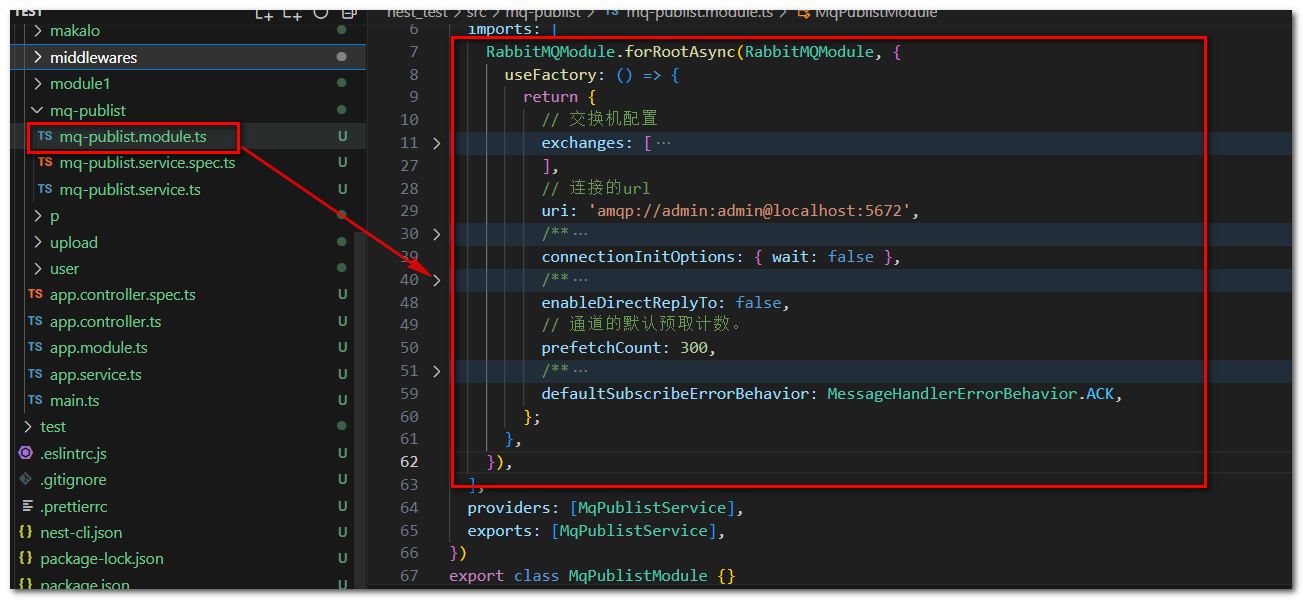
MqPublistService 中的 基本设置
import { AmqpConnection } from '@golevelup/nestjs-rabbitmq';
import { Inject, Injectable, OnModuleInit } from '@nestjs/common';
import { WINSTON_MODULE_PROVIDER } from 'nest-winston';
import { Logger } from 'winston';
@Injectable()
export class MqPublistService implements OnModuleInit {
constructor(
@Inject(WINSTON_MODULE_PROVIDER) private readonly logger: Logger,
private readonly amqp: AmqpConnection
) {}
/**
* onModuleInit 是 NestJS 中一个生命周期钩子方法,
* 它是 @nestjs/common 模块提供的 OnModuleInit 接口的一部分。
* 实现了该接口并实现了 onModuleInit 方法的类,在模块加载时会自动执行该方法
*/
async onModuleInit() {
// 启动监听
this.monitorConn();
}
/**
* rabbitmq连接监听
*/
monitorConn() {
const conn = this.amqp.managedConnection;
if (conn) {
conn.on('connect', () => {
this.logger.info('rabbitmq broker connect');
});
conn.on('disconnect', () => {
this.logger.error('rabbitmq broker disconnect');
});
}
const chan = this.amqp.managedChannel;
if (chan) {
chan.on('connect', () => {
this.logger.info('rabbitmq channel connect');
});
chan.on('error', () => {
this.logger.error('rabbitmq channel error');
});
chan.on('close', () => {
this.logger.error('rabbitmq channel close');
});
}
}
}
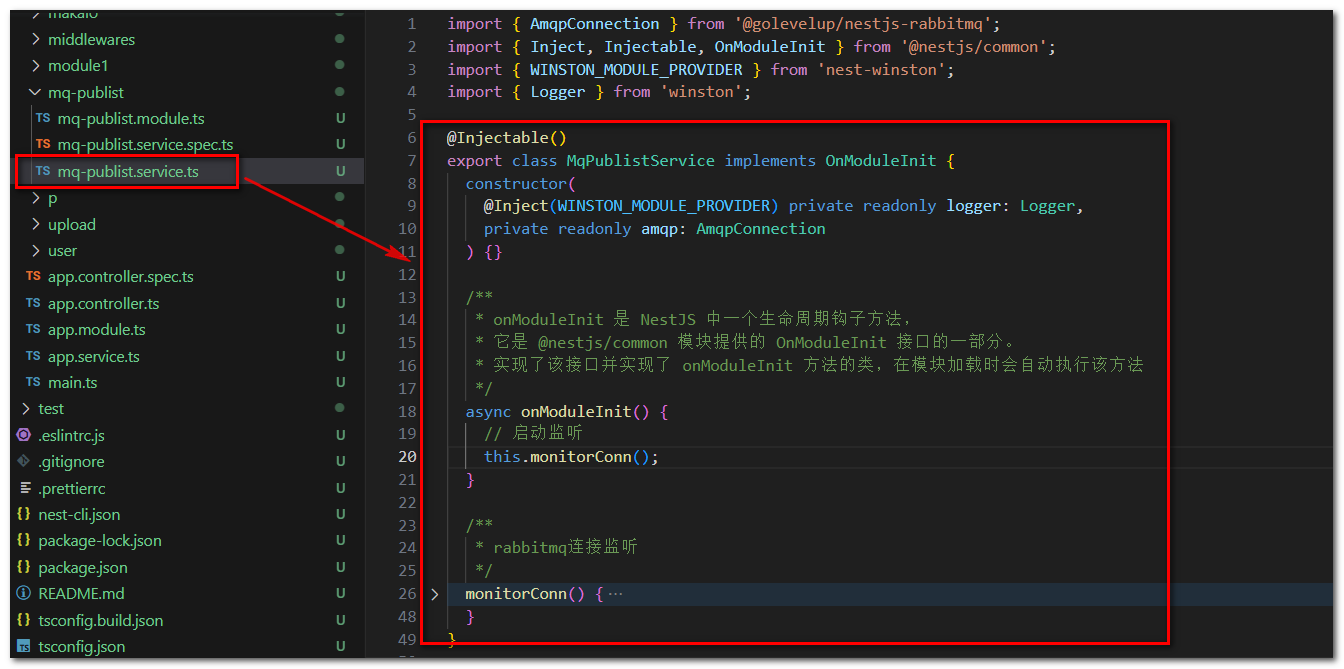
启动
npm run start:dev

这时候我们查看 RabbitMQ 的管理面板,会发现我们配置的交换机出现了
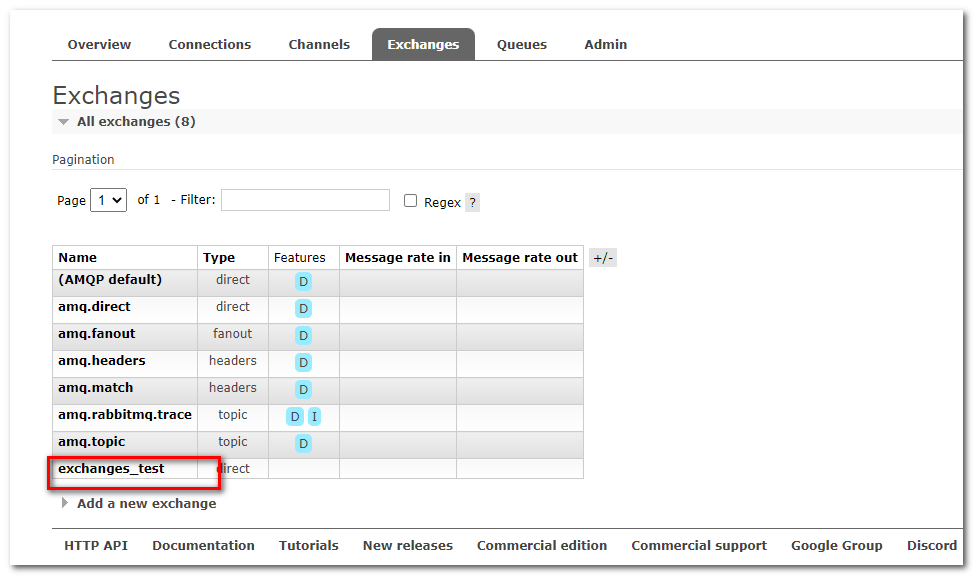
NestJs RabbitMQ 发送队列消息_案例
如果你看过前置知识,你就知道最重要的三个东西
exchange、routingkey, Queue
上面在NestJs 中已经配置了默认的 交换姬 
但是 routingkey, Queue 他们之间的绑定关系还没得呢,这时候我们手动设置一下
打开RabbitMQ 的 管理页面
设置 routingkey, Queue 绑定关系
找到这个交换机,点进去
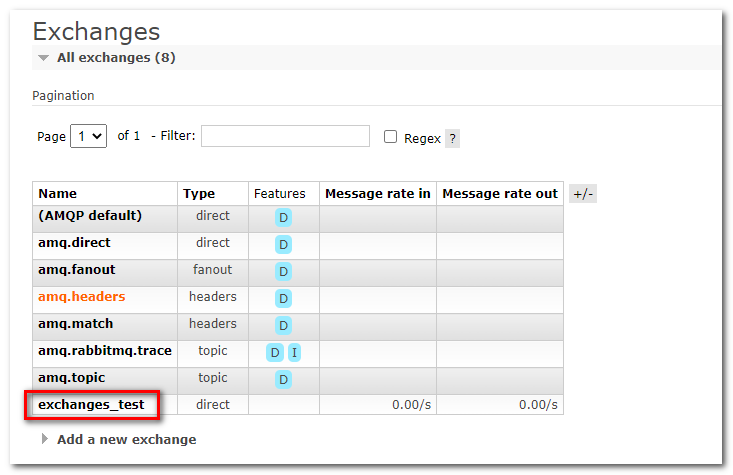
设置 队列名 和 Routing Key 点击绑定
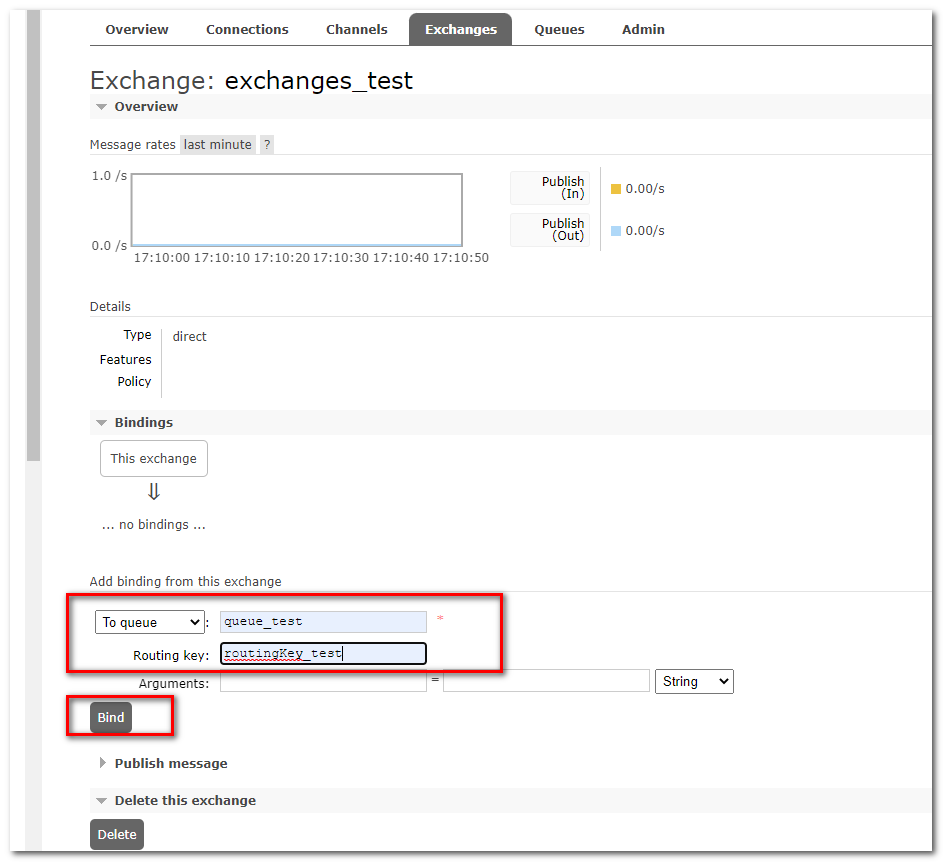
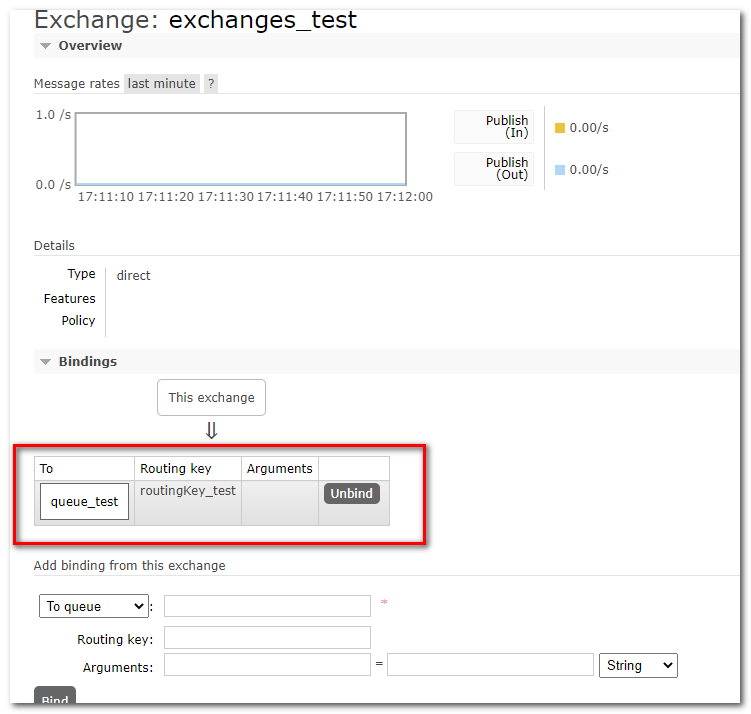
这时候 我们就将 exchange、routingkey, Queue 关联起来了
全局模块注册
app.module.ts
import { MiddlewareConsumer, Module } from '@nestjs/common';
import { AppController } from './app.controller';
import { AppService } from './app.service';
import { CatsController } from './cats/cats.controller';
import { MakaloModule } from './makalo/makalo.module';
import { UploadModule } from './upload/upload.module';
import { UserModule } from './user/user.module';
import { Module1Module } from './module1/module1.module';
import { ConfigModule } from './config/config.module';
import { PModule } from './p/p.module';
import { MqPublistModule } from './mq-publist/mq-publist.module';
// 日志模块
import { WinstonModule } from 'nest-winston';
import * as winston from 'winston';
import 'winston-daily-rotate-file';
@Module({
imports: [MakaloModule, UploadModule, UserModule, Module1Module,
ConfigModule.forRoot({ path: '/makalo' }),
PModule,
MqPublistModule,
// 日志模块
WinstonModule.forRoot({
transports: [
new winston.transports.DailyRotateFile({
dirname: `logs`, // 日志保存的目录
filename: '%DATE%.log', // 日志名称,占位符 %DATE% 取值为 datePattern 值。
datePattern: 'YYYY-MM-DD', // 日志轮换的频率,此处表示每天。
zippedArchive: true, // 是否通过压缩的方式归档被轮换的日志文件。
maxSize: '20m', // 设置日志文件的最大大小,m 表示 mb 。
maxFiles: '14d', // 保留日志文件的最大天数,此处表示自动删除超过 14 天的日志文件。
// 记录时添加时间戳信息
format: winston.format.combine(
winston.format.timestamp({
format: 'YYYY-MM-DD HH:mm:ss',
}),
winston.format.json(),
),
}),
],
}),
],
controllers: [AppController, CatsController],
providers: [AppService],
})
export class AppModule { }
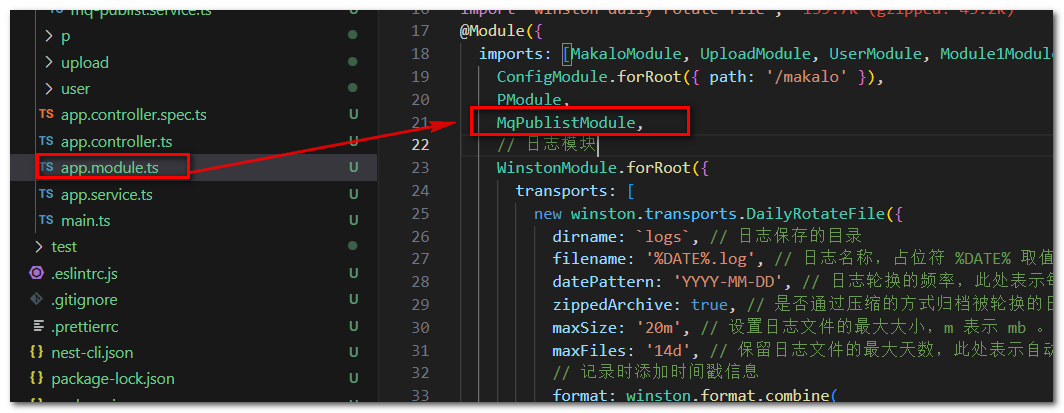
MqPublistModule 模块配置
mq-publist.module.ts
import { Module } from '@nestjs/common';
import { RabbitMQModule, MessageHandlerErrorBehavior } from '@golevelup/nestjs-rabbitmq';
import { MqPublistService } from './mq-publist.service';
@Module({
imports: [
RabbitMQModule.forRootAsync(RabbitMQModule, {
useFactory: () => {
return {
// 交换机配置
exchanges: [
{
// 交换机名称
name: `exchanges_test`,
/**
* 交换机类型
* direct: 直连交换机,根据消息的路由键(routing key)将消息发送到一个或多个绑定的队列。
fanout: 扇形交换机,将消息广播到所有绑定的队列,无需指定路由键。
topic: 主题交换机,根据消息的路由键模式匹配将消息发送到一个或多个绑定的队列。
headers: 头交换机,根据消息的头部信息将消息发送到一个或多个绑定的队列。
*/
type: 'direct',
// 其他选项
// 持久化(Durable): 指定交换机、队列或消息是否需要在服务器重启后保留
options: { durable: false },
},
],
// 连接的url
uri: 'amqp://admin:admin@localhost:5672',
/**
* 用于配置 RabbitMQ 连接的选项。它是一个对象,可以包含以下属性:
wait: 一个布尔值,表示是否等待连接成功后才开始启动应用程序。默认为 true。
rejectUnauthorized: 一个布尔值,表示是否拒绝不受信任的 SSL 证书。默认为 true。
timeout: 一个数字,表示连接超时时间(以毫秒为单位)。默认为 10000 毫秒。
heartbeatIntervalInSeconds: 一个数字,表示心跳间隔时间(以秒为单位)。默认为 60 秒。
channelMax: 一个数字,表示最大通道数。默认为 65535。
这些选项将影响 RabbitMQ 连接的行为和性能。您可以根据需要进行调整
*/
connectionInitOptions: { wait: false },
/**
* 用于启用直接回复模式。当设置为 true 时,
* 生产者将使用 replyTo 和 correlationId 字段指定的队列和标识符来接收响应,
* 而不是使用默认生成的匿名队列。这使得消费者可以将响应直接发送到请求者所在的队列,
* 从而避免了性能上的开销和消息传递中断的问题。
*
* 这里设置为false
*/
enableDirectReplyTo: false,
// 通道的默认预取计数。
prefetchCount: 300,
/**
用于配置 RabbitMQ 消费者订阅的默认错误处理行为选项。
当消费者处理消息时出现错误时,可以使用该选项来指定消费者应如何处理这些错误。
MessageHandlerErrorBehavior.ACK 表示在发生错误时自动确认消息并从队列中删除
以避免消息反复传递和死信队列的问题。
如果您想要更多的控制权来处理错误,可以将其设置为
MessageHandlerErrorBehavior.NACK,然后手动决定是否重新排队或丢弃该消息。
*/
defaultSubscribeErrorBehavior: MessageHandlerErrorBehavior.ACK,
};
},
}),
],
providers: [MqPublistService],
exports: [MqPublistService],
})
export class MqPublistModule {}
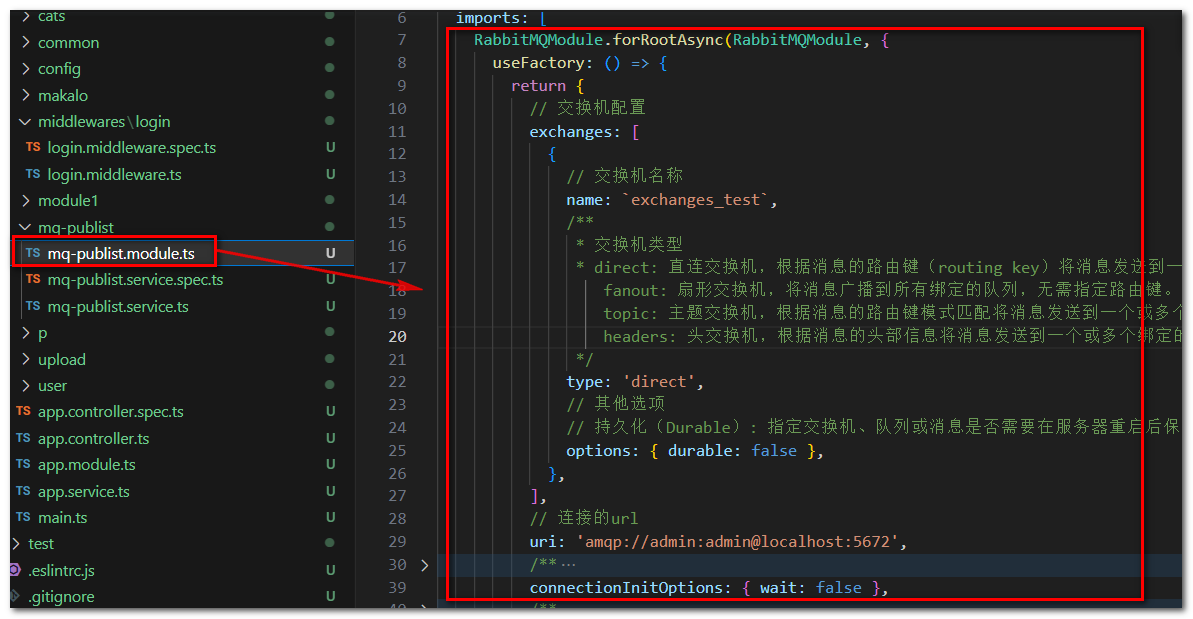
MqPublistService 封装
mq-publist.service.ts
import { AmqpConnection } from '@golevelup/nestjs-rabbitmq';
import { Inject, Injectable, OnModuleInit } from '@nestjs/common';
import { WINSTON_MODULE_NEST_PROVIDER, WINSTON_MODULE_PROVIDER } from 'nest-winston';
import { Logger } from 'winston';
@Injectable()
export class MqPublistService implements OnModuleInit {
constructor(
@Inject(WINSTON_MODULE_PROVIDER) private readonly logger: Logger,
private readonly amqp: AmqpConnection
) {}
/**
* onModuleInit 是 NestJS 中一个生命周期钩子方法,
* 它是 @nestjs/common 模块提供的 OnModuleInit 接口的一部分。
* 实现了该接口并实现了 onModuleInit 方法的类,在模块加载时会自动执行该方法
*/
async onModuleInit() {
// 启动监听
this.monitorConn();
}
/**
* rabbitmq连接监听
*/
monitorConn() {
const conn = this.amqp.managedConnection;
if (conn) {
conn.on('connect', () => {
this.logger.info('rabbitmq broker connect');
});
conn.on('disconnect', () => {
this.logger.error('rabbitmq broker disconnect');
});
}
const chan = this.amqp.managedChannel;
if (chan) {
chan.on('connect', () => {
this.logger.info('rabbitmq channel connect');
});
chan.on('error', () => {
this.logger.error('rabbitmq channel error');
});
chan.on('close', () => {
this.logger.error('rabbitmq channel close');
});
}
}
// exchange
private readonly exc_test = `exchanges_test`;
// routingKey
private readonly routingKey_test = 'routingKey_test';
/**
* rabbitmq发送消息
* @param message
*/
async pubMQMsgTest(message: any): Promise<void> {
await this.amqp.publish(this.exc_test, this.routingKey_test, message);
this.logger.info(
`amqp publish message -> exchange : ${this.exc_test}, routingKey : ${this.routingKey_test},message : ${JSON.stringify(
message,
)}`,
);
}
}

其他模块中使用
import { MqPublistService } from '../mq-publist/mq-publist.service';
constructor(
private readonly mqPublishService: MqPublistService,
) { }
// 发送 RabbitMQ 消息
this.mqPublishService.pubMQMsgTest('test send push RabbitMQ');
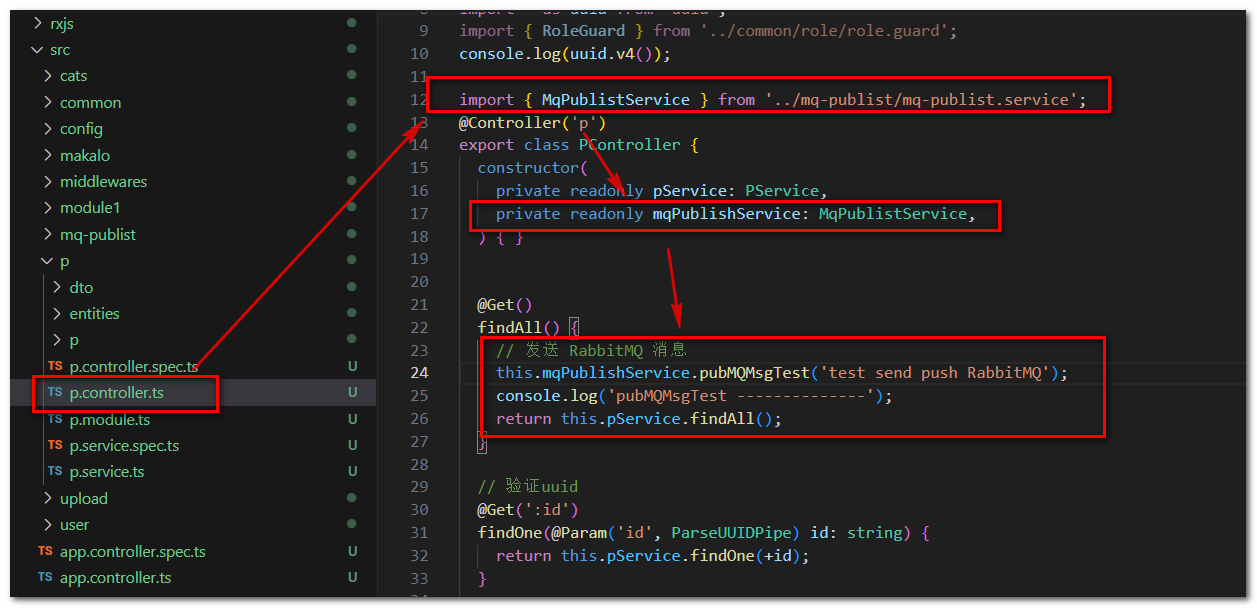
RabbitMQ 管理页面中查看
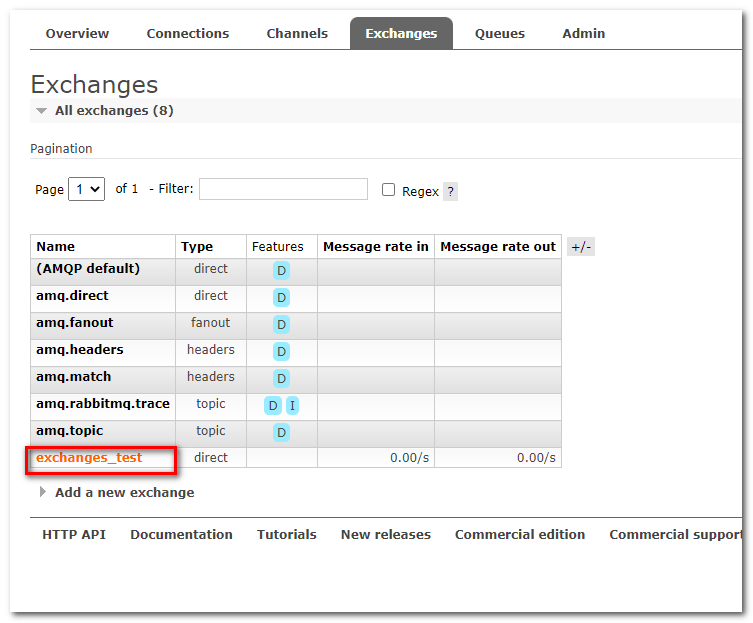
单击队列名直接跳转到对应的队列
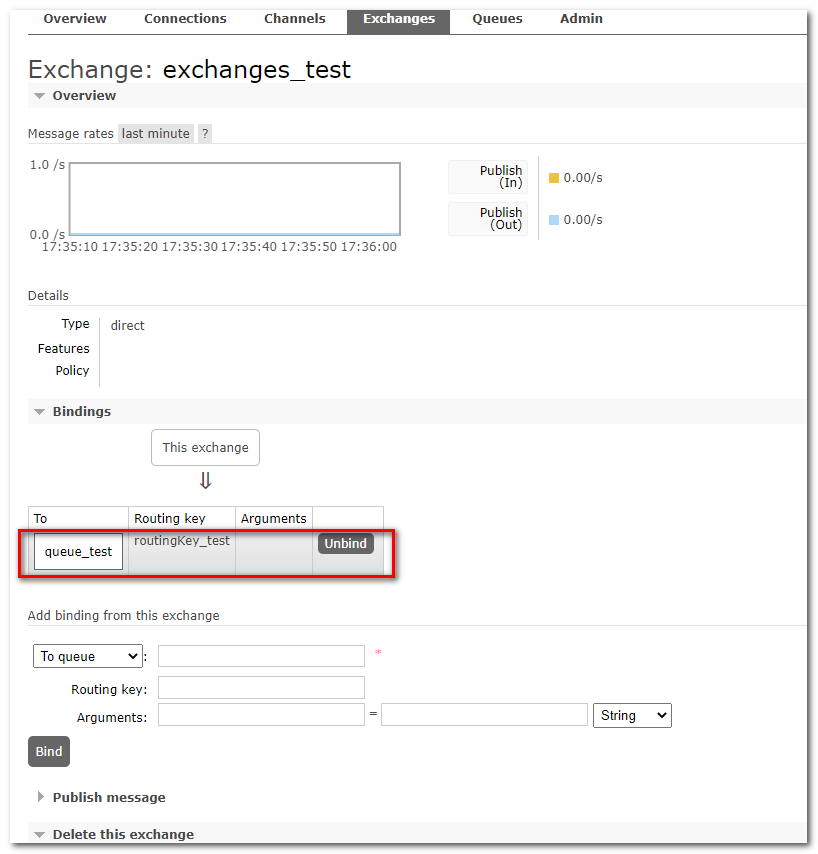
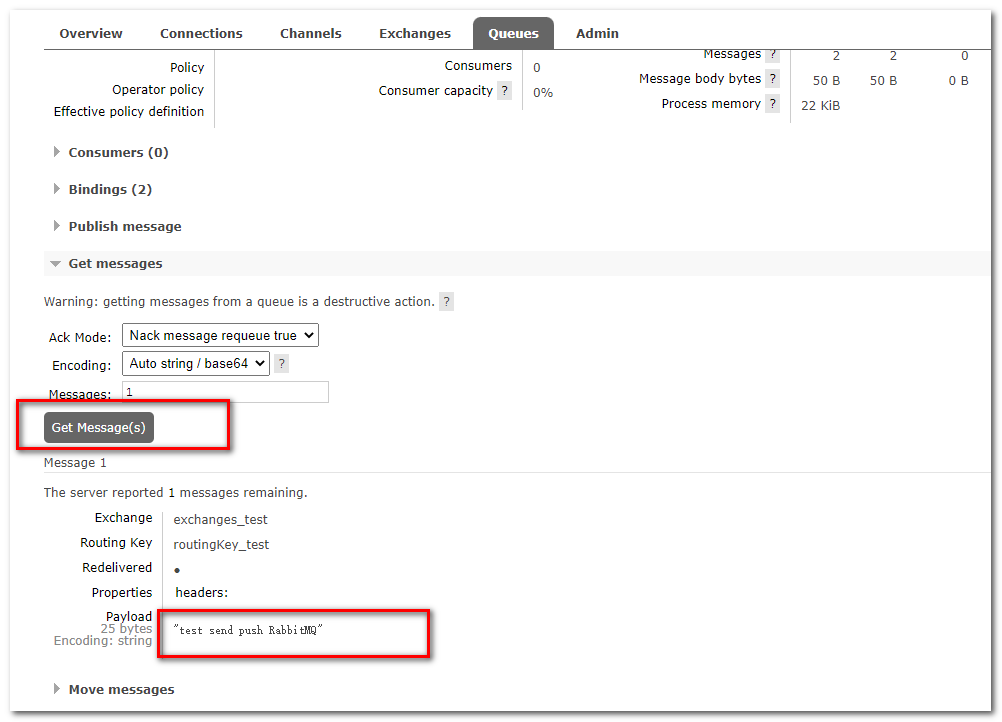
NestJs RabbitMQ 订阅队列消息_案例
nest g mo mqSubscribe
nest g s mqSubscribe

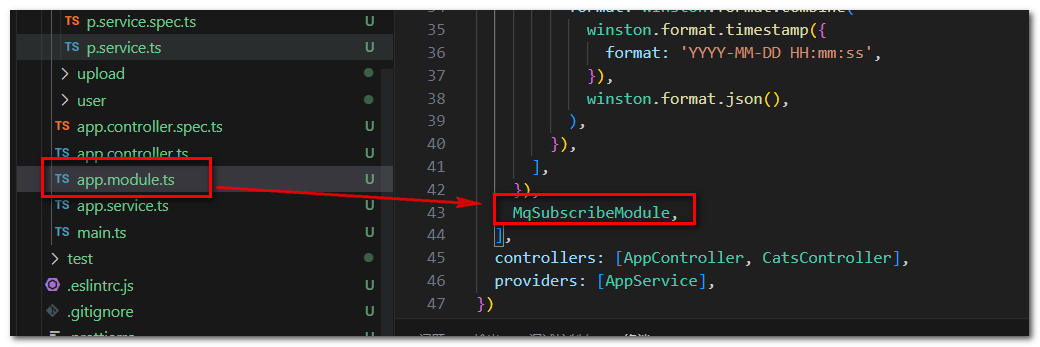
MqSubscribeModule
mq-subscribe.module.ts
import { Module } from '@nestjs/common';
import { MqSubscribeService } from './mq-subscribe.service';
@Module({
providers: [MqSubscribeService]
})
export class MqSubscribeModule {}
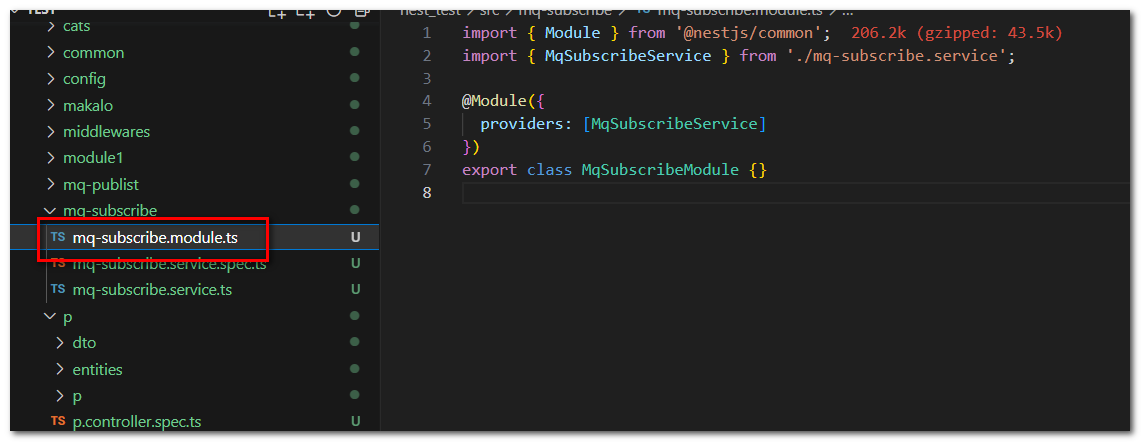
MqSubscribeService
mq-subscribe.service.ts
import { Inject, Injectable } from '@nestjs/common';
import { WINSTON_MODULE_PROVIDER } from 'nest-winston';
import { RabbitSubscribe } from '@golevelup/nestjs-rabbitmq';
import { Logger } from 'winston';
@Injectable()
export class MqSubscribeService {
constructor(
@Inject(WINSTON_MODULE_PROVIDER) private readonly logger: Logger,
) { }
@RabbitSubscribe({
// 交换机
exchange: `exchanges_test`,
routingKey: [
'routingKey_test',
],
// 队列
queue: `queue_test`,
// 持久化配置
queueOptions: { durable: true },
})
// 收到队列的订阅消息自动调用该方法
async subscribe(data: any): Promise<any> {
const routingKey = arguments[1].fields.routingKey;
console.log('arguments[1].fields.exchange :', arguments[1].fields.exchange);
console.log('routingKey :', routingKey);
console.log('data:', data);
this.logger.info(
`amqp receive msg,exchange is ${arguments[1].fields.exchange},routingKey is ${routingKey},msg is ${JSON.stringify(
data,
)}`,
);
}
}
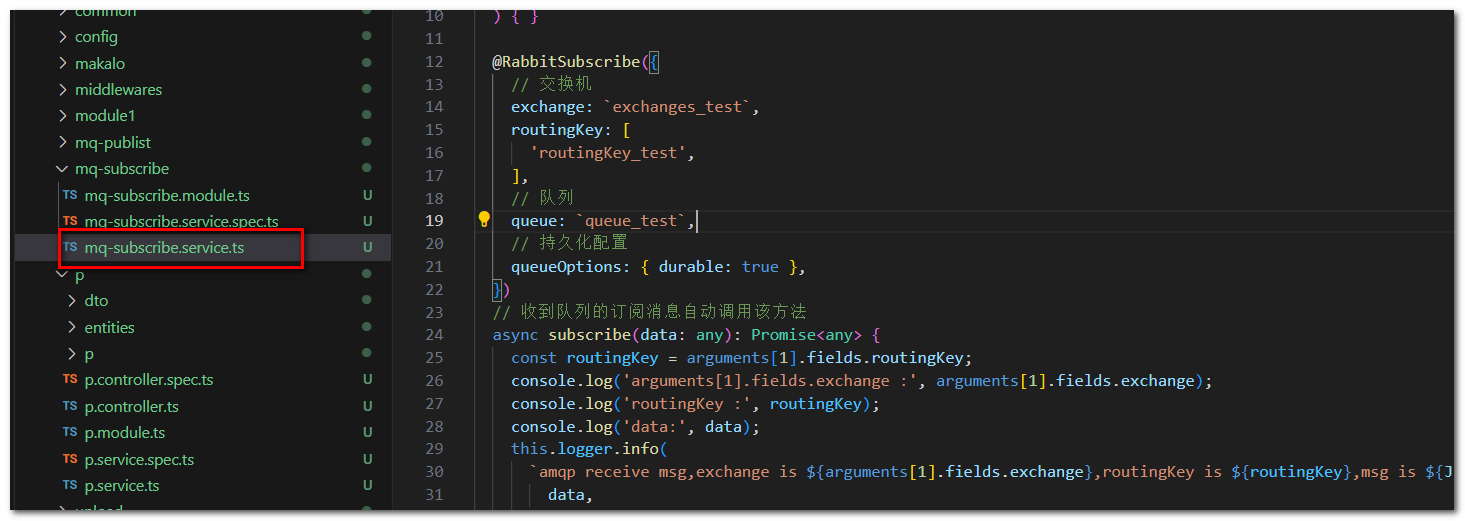
使用上面的发送消息再次访问
http://localhost:3000/p

本文作者:makalo
本文链接:https://www.cnblogs.com/makalochen/p/17382858.html
版权声明:本作品采用知识共享署名-非商业性使用-禁止演绎 2.5 中国大陆许可协议进行许可。





【推荐】国内首个AI IDE,深度理解中文开发场景,立即下载体验Trae
【推荐】编程新体验,更懂你的AI,立即体验豆包MarsCode编程助手
【推荐】抖音旗下AI助手豆包,你的智能百科全书,全免费不限次数
【推荐】轻量又高性能的 SSH 工具 IShell:AI 加持,快人一步
· 被坑几百块钱后,我竟然真的恢复了删除的微信聊天记录!
· 没有Manus邀请码?试试免邀请码的MGX或者开源的OpenManus吧
· 【自荐】一款简洁、开源的在线白板工具 Drawnix
· 园子的第一款AI主题卫衣上架——"HELLO! HOW CAN I ASSIST YOU TODAY
· Docker 太简单,K8s 太复杂?w7panel 让容器管理更轻松!